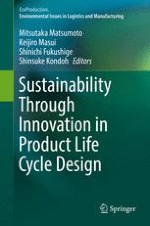2017 | OriginalPaper | Buchkapitel
Eco-design and Life Cycle Assessment of Japanese Tableware from Palm-Melamine Bio-composites
verfasst von : Singh Intrachooto, Rattanawan Mungkung, Kittiwan Kitpakornsanti
Erschienen in: Sustainability Through Innovation in Product Life Cycle Design
Verlag: Springer Singapore
Aktivieren Sie unsere intelligente Suche, um passende Fachinhalte oder Patente zu finden.
Wählen Sie Textabschnitte aus um mit Künstlicher Intelligenz passenden Patente zu finden. powered by
Markieren Sie Textabschnitte, um KI-gestützt weitere passende Inhalte zu finden. powered by
